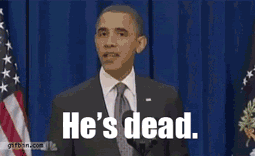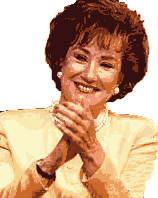If, as now seems clear, the nation is headed for a close, razor-thin presidential election, it is not (as most pundits say) jobs and the economy, or (as many pundits think but don't say) race or religion, that will decide the outcome.
Rather, the deciding factor is far likelier to be a little discussed internet operation called Americans Elect. That elegantly titled organization is the joker in the presidential election deck that could trump every other card and determine whether Barack Obama or Mitt Romney is elected in November.
Americans Elect is a political reform movement funded by Peter Ackerman and others, and supported by some distinguished citizens like former New Jersey governor Christine Todd Whitman, television producer Mark Burnett, and former FBI Director William Webster, who sit on its advisory committee. The object of Americans Elect is to assemble a non-partisan ticket through a series of caucuses and national nominating convention on the internet. To "balance" the ticket, presidential candidates seeking Americans Elect's nomination must select a vice presidential candidate from the other party (or if an independent, tilting the other way). More than 2.5 million individuals have already qualified as delegates to vote in this nomination process.
The remarkable -- and unprecedented -- achievement of this movement is that it is laying claim to a voting line for president in just about every one of the 50 states. The group's larger objective is to collect enough votes in each state to maintain that powerful political positioning for congressional and other races in 2014, as well as quadrennial national elections in 2016.
Americans Elect is sparked by concerns that the two major political parties are so partisan and polarized that they have paralyzed the national government in Washington. It hopes to return control of the Congress and executive branch to a moderate middle ready to compromise. Americans Elect would rather be seen as middle-of-the-road mediator than a third party, but its impact this year will be like that of a third party.
We haven't seen anything quite like Americans Elect with a line in every state ballot. But we have seen third parties. The two most recent examples show the political mischief such parties can cause, however well meaning. Ross Perot ran on a Reform Party line in several states in 1996. Thanks to the conservative votes he garnered, Bill Clinton defeated George H.W. Bush. Ralph Nader ran in 2000 and captured enough votes in Florida to snatch that state from Al Gore and put George W. Bush in the White House.
If the presidential candidate of Americans Elect is conservative, that will almost certainly gain Barack Obama a second term. If, on the other hand, its candidate is liberal, that will likely send Mitt Romney to the White House. The "balance" required for the vice presidential nominee will be lost on voters who focus on the top of the ticket.
The potential for malevolent mischief is enormous. In the no-holds-barred world of presidential politics, it is in the interest of Democrats to maneuver for a conservative or Republican to be Americans Elect's presidential candidate, while Republicans will want a liberal or Democrat to be the Americans Elect nominee.
Think about this: Ideologically driven high roller super PACs on the left would like to see a conservative like Ron Paul for the Americans Elect nomination, while right-wingers with deep pockets like the Koch brothers would prefer a liberal like Bernie Sanders in that position. (Americans Elect's web site lists both as possible nominees.) Moreover, hard-nosed Democratic campaign professionals may seek discreet (deniable) ways to discourage any liberal or Democrat who wins the internet nomination from accepting it; their Republican counterparts will pressure any winning conservative or Republican candidate to just say no.
The backers of Americans Elect are well-intentioned and concerned, as many of us are, with the dysfunction in Washington. Congress is gridlocked in perpetual campaign mode as control of the Senate and House are up for grabs every two years. Indeed, in an act of supreme political cowardice and individual self-interest, both parties have quietly agreed to put off the pressing budget and public debt issues, like raising taxes and trimming entitlements, until after the election -- and then to be handled in a lame duck session filled with members who did not run for reelection, lost their reelection bids, or won by camouflaging their true intentions during the campaign!
The frustration of the Americans Elect folks is understandable. But even the most well-intentioned initiatives can produce unintended, and in this case, dangerous consequences. Before we replace the two-party system with the dream of a mediating non-partisan middle, we should ponder the old Basuto proverb: "If a man does away with his traditional way of living and throws away his good customs, he had better first make certain he has something of value to replace them."
Two-party petty partisanship may not look like a tradition worth keeping or a good custom today, but does introducing a third party that is virtually certain to tip the election to one of the other two offer a better value for our nation?
Rather, the deciding factor is far likelier to be a little discussed internet operation called Americans Elect. That elegantly titled organization is the joker in the presidential election deck that could trump every other card and determine whether Barack Obama or Mitt Romney is elected in November.
Americans Elect is a political reform movement funded by Peter Ackerman and others, and supported by some distinguished citizens like former New Jersey governor Christine Todd Whitman, television producer Mark Burnett, and former FBI Director William Webster, who sit on its advisory committee. The object of Americans Elect is to assemble a non-partisan ticket through a series of caucuses and national nominating convention on the internet. To "balance" the ticket, presidential candidates seeking Americans Elect's nomination must select a vice presidential candidate from the other party (or if an independent, tilting the other way). More than 2.5 million individuals have already qualified as delegates to vote in this nomination process.
The remarkable -- and unprecedented -- achievement of this movement is that it is laying claim to a voting line for president in just about every one of the 50 states. The group's larger objective is to collect enough votes in each state to maintain that powerful political positioning for congressional and other races in 2014, as well as quadrennial national elections in 2016.
Americans Elect is sparked by concerns that the two major political parties are so partisan and polarized that they have paralyzed the national government in Washington. It hopes to return control of the Congress and executive branch to a moderate middle ready to compromise. Americans Elect would rather be seen as middle-of-the-road mediator than a third party, but its impact this year will be like that of a third party.
We haven't seen anything quite like Americans Elect with a line in every state ballot. But we have seen third parties. The two most recent examples show the political mischief such parties can cause, however well meaning. Ross Perot ran on a Reform Party line in several states in 1996. Thanks to the conservative votes he garnered, Bill Clinton defeated George H.W. Bush. Ralph Nader ran in 2000 and captured enough votes in Florida to snatch that state from Al Gore and put George W. Bush in the White House.
If the presidential candidate of Americans Elect is conservative, that will almost certainly gain Barack Obama a second term. If, on the other hand, its candidate is liberal, that will likely send Mitt Romney to the White House. The "balance" required for the vice presidential nominee will be lost on voters who focus on the top of the ticket.
The potential for malevolent mischief is enormous. In the no-holds-barred world of presidential politics, it is in the interest of Democrats to maneuver for a conservative or Republican to be Americans Elect's presidential candidate, while Republicans will want a liberal or Democrat to be the Americans Elect nominee.
Think about this: Ideologically driven high roller super PACs on the left would like to see a conservative like Ron Paul for the Americans Elect nomination, while right-wingers with deep pockets like the Koch brothers would prefer a liberal like Bernie Sanders in that position. (Americans Elect's web site lists both as possible nominees.) Moreover, hard-nosed Democratic campaign professionals may seek discreet (deniable) ways to discourage any liberal or Democrat who wins the internet nomination from accepting it; their Republican counterparts will pressure any winning conservative or Republican candidate to just say no.
The backers of Americans Elect are well-intentioned and concerned, as many of us are, with the dysfunction in Washington. Congress is gridlocked in perpetual campaign mode as control of the Senate and House are up for grabs every two years. Indeed, in an act of supreme political cowardice and individual self-interest, both parties have quietly agreed to put off the pressing budget and public debt issues, like raising taxes and trimming entitlements, until after the election -- and then to be handled in a lame duck session filled with members who did not run for reelection, lost their reelection bids, or won by camouflaging their true intentions during the campaign!
The frustration of the Americans Elect folks is understandable. But even the most well-intentioned initiatives can produce unintended, and in this case, dangerous consequences. Before we replace the two-party system with the dream of a mediating non-partisan middle, we should ponder the old Basuto proverb: "If a man does away with his traditional way of living and throws away his good customs, he had better first make certain he has something of value to replace them."
Two-party petty partisanship may not look like a tradition worth keeping or a good custom today, but does introducing a third party that is virtually certain to tip the election to one of the other two offer a better value for our nation?












0 comments:
Post a Comment